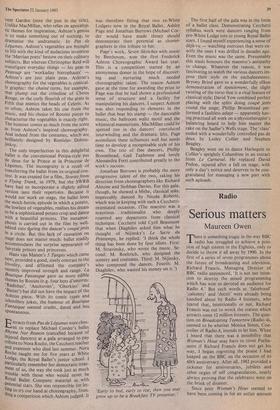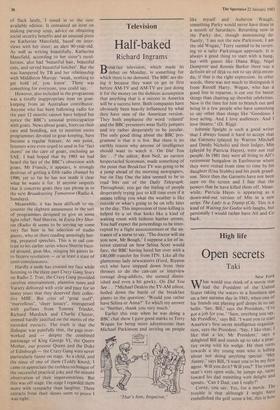Radio
Serious matters
Maureen Owen
'There is something tragic in the way BBC I radio has struggled to achieve a posi- tion of high esteem in the Eighties, only to decide to throw it all away by 1990. In the first of a series of seven programmes about the future of broadcasting and television, Richard Francis, Managing Director of BBC radio announced, 'It is not our inten- tion to destroy the mixed programming which has won so devoted an audience for Radio 4.' But such words as 'falsehood' 'calumny' and 'deceit' were already being bandied about by Radio 4 listeners, who feared that, intentionally or not, Richard Francis was out to wreck the station which attracts some 12 million listeners. The ques- tion on Broadcasting Tomorrow (Radio 4), seemed to be whether Monica Simm, Con- troller of Radio 4, intends to let him. When I heard that there was a possibility that Woman's Hour may have to cover Parlia- ment if Richard Francis does not get his way, I began regretting the praise 1 had heaped on the BBC on the occasion of its 60th anniversary. After all, 1982 provided a sickener for anniversaries, jubilees and other orgies of self congratulation, nearly always proving that the celebrants were on the brink of disaster.
Since poor Woman's Hour seemed to have been coming in for an unfair amount
of flack lately, I tuned in to the next available edition. It contained an item on making parsnip soup, advice on obtaining social security benefits and an unusual piece on Katherine Mansfield, based on inter- views with her sister; an. alert 90-year-old. As well as writing beautifully, Katherine Mansfield, according to her sister's recol- lection, also had 'beautiful hair, beautiful eyes, and served beautiful lunches'. But she was hampered by TB and her relationship with Middleton Murray: 'weak, nothing to get hold of, you know'. There was something for everyone, you could say.
However, also included in the programme was a totally inappropriate item on goat- keeping from an Australian contributor. Anyone who has been following radio for the past 12 months cannot have helped but notice the BBC's unusual preoccupation with goats. News about goats, hints on their care and breeding, not to mention entire programmes devoted to goat-keeping, have become a regular feature. At one point, listeners were even urged to send in for 'fact sheets' on the care- of goats, enclosing an SAE. I had hoped that by 1983 we had heard the last of the BBC's obsession with goats. Mr Francis, it appears, is strongly desirous of getting a fifth radio channel by 1990, yet so far he has not made it clear what he wants it for. If anyone suspects that it concerns goats they can phone in to the next Broadcasting Tomorrow (Radio 4, Sundays).
Meanwhile, it has been difficult to en- counter the slightest amusement in the sort of programmes designed to give us some light relief. Ned Sherrin, in Extra Dry Sher- rin (Radio 4) seems to be serving up some very flat beer in his selection of studio guests, who sit there reading amazingly bor- ing, prepared speeches. This is in sad con- trast to his earlier series where Sherrin buzz- ed around, gnat-like, stinging his guests in- to bizarre revelation — or at least a state of semi-consciousness.
Hardly a smile has crossed my face while listening to the three-part Crazy Gang Story on Radio 2. True, the Crazy Gang provided carefree entertainment, plaintive tunes and Variety delivered with style and pace for so many years that they deserved their collec- tive MBE. But cries of 'great stuff, 'marvellous', 'sheer lunacy', interspersed with guffaws from Tommy. Trinder, Richard Murdoch and Charlie Chester, seemed hardly justified on the merits of the recorded extracts. The truth is that the dialogue was painfully thin, the gags over- worked and — despite the combined patronage of King George VI, the Queen Mother, our present Queen and the Duke of Edinburgh — the Crazy Gang were never particularly funny on stage. As a child, and the niece of one of them (Teddy Knox), 1 came to appreciate the ruthless technique of the successful practical joke and the minute observation of their impersonations. But this was off stage. On stage I regarded them more with sympathy than laughter. These extracts from their shows seem to prove I was right.







































 Previous page
Previous page